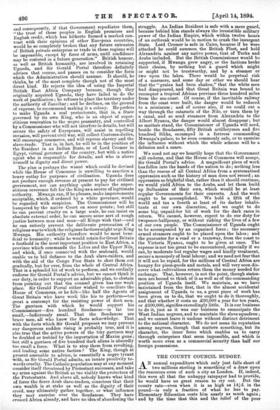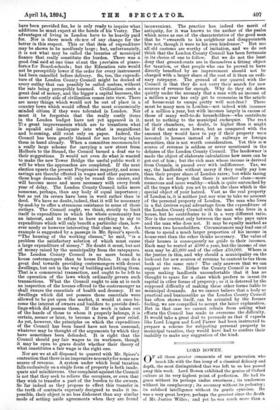THE COUNTY COUNCIL BUDGET.
AN annual expenditure which only just falls short of two millions sterling is something of a draw upon the resources even of such a city as London. If, indeed, this were all that the unhappy ratepayer had to provide, he would have no great reason to cry out. But the county rate—even when it is as high as 144 d. in the pound—is only a fraction of what he has to pay. Elementary Education costs him nearly as much again ; and by the time that this and the relief of the poor have been provided for, he is only ready to inquire what additions he must expect at the hands of his Vestry. The advantages of living in London have to be heavily paid for. Nor is there much chrn.ce of any change for the better in this respect. This or that, item of expenditure may be shown to be needlessly large ; but, unfortunately, it is not what may be called the luxuries of municipal finance that really constitute the burden. There was a good deal said at one time alcout the provision of piano- fortes for Board-schools ; but the Education rate would not be perceptibly lower if the order for every instrument had been cancelled before delivery. So, too, the expendi- ture of the London County Council might be docked of every outlay that can possibly be called useless, without the rate being perceptibly lessened. Civilisation costs a great deal of money, and the bigger a capital becomes, the more the costly side of civilisation comes into view. There are many things which would not be out of place in a country town which would offend the most economically minded citizen if they were tolerated in London. Nor must it be forgotten that the really costly items in the London budget have not yet appeared in it. Tk e great improvements which are to transform what is squalid and inadequate into what is magnificent and becoming, still exist only on paper. Indeed, the Council has been greatly blamed for not having taken them in hand already. When a committee recommended a really large scheme for carrying a new street from Holborn to the Strand, the Council turned a deaf ear to their suggestions. It would not even do what is wanted to make the new Tower Bridge the useful public work it will be when the approaches are completed. If the next election upsets the present Progressive majority, and some savings are thereby effected in wages and other payments, these huge demands will only be round the corner, and will become more and more necessary with every fresh year of delay. The London County Council talks more nonsense, perhaps, than any body of equal importance ; but as yet its errors have been in word rather than in deed. We have no doubt, indeed, that it will be necessary by-and-by to offer a strenuous resistance to some of these outlays. The Council ought, we think, strictly to limit itself to expenditure in which the whole community has an interest, and to refuse to have anything to say to expenditure which will only benefit a particular class, how- ever needy or however interesting that class may be. An example is suggested by a passage in Mr. Spicer's speech. 'The housing of the working classes," he said, "is a problem the satisfactory solution of which must cause a large expenditure of money." No doubt it must, but not of money raised by the municipality from the ratepayers. The London County Council is no more bound to house costermongers than to house Dukes. It can do a great deal towards providing costermongers with decent dwellings, but not in the way of building and letting them. That is a commercial transaction, and ought to be left to the operation of the laws which ordinarily govern such transactions. What the Council ought to aim at is such an inspection of the houses offered to the costermonger as - shall ensure the essentials of health and decency. If no dwellings which did not possess these essentials were allowed to be put upon the market, it would at once be- come the interest of owners and builders to provide dwel- lings which did possess them. If the work is taken out of the hands of those to whom it properly belongs, it is certain, sooner or later, to become a form of poor relief. As yet, however, the principles on which the expenditure of the Council has been based have not been unsound, whatever may be thought of the arguments by which they have sometimes been defended. It is right that the Council should pay fair wages to its workmen, though it may be open to grave doubt whether their theory of what constitutes a fair wage is the right one.
Nor are we at all disposed to quarrel with Mr. Spicer's contention that there is an imperative necessity for some new source of revenue. A system under which local taxation falls exclusively on a single form of property is both inade- quate and mischievous. Our complaint against the Council is not that they seek to relieve the occupiers, or even that they wish to transfer a part of the burden to the owners. So far indeed as they propose to effect this transfer in the teeth of contracts expressly designed to make it im-. possible, their object is no less dishonest than any similar mode of setting aside agreements when they are found inconvenient. The practice has indeed the merit of antiquity, for it was known to the author of the psalm which notes as one of the characteristics of the good man that he " sweareth to his neighbour and disappointeth him not, though it were to his own hindrance." But not all old customs are worthy of imitation, and we do not think that the London County Council has been fortunate in its choice of one to follow. But we do not the least deny that ground-rents are in themselves a fitting object for taxation, or that people who can be proved to have directly benefited by an improvement should not be charged with a larger share of the cost of it than an ordi- nary ratepayer. The ground of our quarrel with the Council is that they do not carry their search for new sources of revenue far enough. Why do they sit down quietly under the anomaly that a man with an income of a million a year has only got to economise in'the article of house-rent to escape pretty well scot-free ? There must be many men in London—not indeed with incomes of a million a year, but with incomes largely in excess of those of many well-to-do householders—who contribute next to nothing to the municipal exchequer. The relit of their chambers, no doubt, is higher than it might be if the rates were lower, but as compared with the amount they would have to pay if their property were invested in houses instead of in railways or foreign securities, this is not worth consideration. Yet this ne w source of revenue is seldom or never mentioned in the debates of the London County Council. The landowner is made the object of elaborate calculations how more can be got out of him ; but the rich man whose income is derived from Consols, is passed over with indifference. Tax, we say, the landlords without mercy if they really pay less than their proper share of London rates ; but while taxing them, do not forget that there is another class—more numerous and more wealthy—which is quite untouched by all the traps which you set to catch the class which is the special object of your hatred. Vast as the real property of London is, it is neither just nor wise to take no account of the personal property of London. The man who lives in a flat derives equal advantage from the expenditure of the London County Council with the man who lives in a house, but he contributes to it in a very different ratio. Nor is the contrast only between the man who pays rates and the man who does not. It may be equally marked as between two householders. Circumstances may lead one of them to spend a much larger proportion of his income in house-rent than the other thinks necessary. The value of their houses is consequently no guide to their incomes. Each may be rented at £500 a year, but the income of one man may be £5,000 and of the other £50,000. Where is the justice in this, and why should a municipality on the look-out for new sources of revenue be content to tax them both at the same rate ? The only answers that we can suggest are two. Either the County Council is so bent upon making landlords uncomfortable that it has no thought to spare for a class which prefers to invest its capital in other forms of property ; or it is deterred by the supposed difficulty of making these other forms liable to municipal demands. As we cannot believe that a body so practical and businesslike as the London County Council has often shown itself, can be actuated by the former feeling, we are compelled to accept the latter explanation. But in that case we cannot refrain from asking what efforts the Council has made to overcome the difficulty. It would take a great deal to persuade us that if experts like Lord Lingen and. Lord Farrer had been instructed to prepare a scheme for subjecting personal property to municipal taxation, they would have had to confess their inability to make any suggestion of the kind.



































 Previous page
Previous page